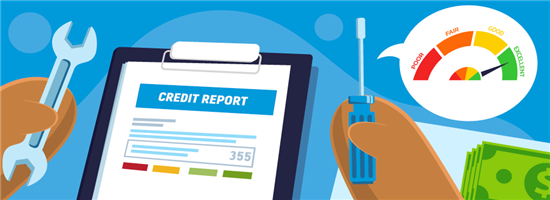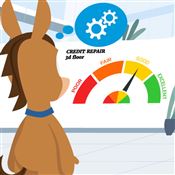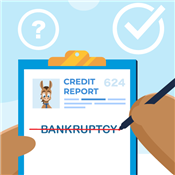DIY Credit Repair
Credit repair companies can cost a hundred dollars per month. But you can perform their services yourself and spend $0 to restore your credit. Here's how.
 |
It can be tough to live with poor credit. And unfortunately, credit won't always improve by itself.
However, credit repair services can be costly. What if you don't have the budget?
The solution: DIY credit repair. The only spending you need to worry about are time and effort. Read on.
What Is DIY Credit Repair?
DIY credit repair refers to fixing your credit by disputing items on your credit report. You'll review your credit reports, write dispute letters to credit bureaus, and communicate and settle with creditors on your own.
You'll essentially be doing what credit repair companies do.
As a consumer, you have the right to advocate for your credit. So, DIY credit repair is entirely legal, especially if there are inaccurate items significantly impacting your credit and your overall finances.
Here's how you can get started.
How to Repair Credit Yourself
You can repair your credit in 7 steps. Steps 4 and 5 may seem intimidating, but there are ways to get it done. And if you need additional tools, using apps like Self can assist you in building credit while managing disputes.
Yes, you can still fix poor credit, but it will take time and effort. To start, you can perform a DIY credit repair, pay your bills on time, and diversify your credit lines. Note that all your transactions every month can affect your credit. And it can take more than a year to see changes in your credit score.
Apply for a Credit Builder Account at Self
- Get the Credit Builder Account that helps build credit today!
- Choose the plan that fits within your budget
- Monthly payments are reported to the three major credit bureaus.
Get copies of your credit reports
First, you need to know what's going on in your report to know the right actions to take. You can access your latest credit reports from the credit bureaus like Equifax, Experian, and TransUnion.
Note that credit reports can cost you up to $14.50 per report (and not more).[1] But you can get weekly credit reports for free from AnnualCreditReport.com. It's the only source authorized by the Federal Law to give free credit reports.
Review credit reports
Next, review all your transactions in each credit report and personal information. Check for any errors.
Your goal is to look for items that are inaccurate, unverified, and outdated. These derogatory items affect your credit negatively, often resulting in lower credit scores.
Here's what you need to particularly look at:
- Account types and negative items
- Creditor names and addresses
- Current balances
- Transaction dates
- Account status
- Soft and hard inquiries
- Last payments
Some items may not be present in your reports. You must reconcile and ensure the information is consistent with the credit bureaus.
Identity theft is common. You may see transactions you didn't make. It's your right and responsibility to dispute these items especially if they're affecting your credit.
Write dispute letters
When you're done listing the negative items, it's time to write a dispute letter. Ensure you state the reason for disputing the item, especially if these items are outdated and incorrect.
Be comprehensive and strategic in your disputes to guarantee higher success of removals. For example, you can take note of strategic ways to write dispute letters for bankruptcies, collection accounts and late payments.
Send dispute letters to credit bureaus
You can send your dispute letters to the credit bureaus through email or physical letters. Either way, your letters need to be complete with details, reason for the dispute, and removal request.
You need to send these letters along with copies of proof (if any). This way, you have backups for your claims.
Here are the details for each credit bureau:
Equifax[2]
- Dispute Form Link: Equifax Form
- Address: Equifax Information Services, LLC
P.O. Box 740256, Atlanta, GA 30374-0256
Experian[3]
- Dispute Form Link: Experian Form
- Address: Experian
P.O. Box 4500, Allen, TX 75013
TransUnion[4]
- Dispute Form Link: TransUnion Form
- Address: TransUnion Consumer Solutions
P.O. Box 2000, Chester, PA 19016-2000
Correspond with creditors
Don't limit yourself to credit bureau disputes. If you have creditors, you'll need to reach out and use goodwill interventions or pay-per-delete letters to settle your accounts.
You can write a dispute letter as you would with a credit bureau. You may also call the office locations to settle your accounts. There's no harm in trying to settle with your creditors and asking for compromise and courtesy.
Wait for results
After reviewing and sending dispute letters, you'll need to wait for the response. It usually takes 30 days for credit bureaus to do an investigation and verify your disputes.
Then, they have 5 business days to inform you of the result. However, credit bureaus will gain an additional 15 days if you send additional evidence or proof after sending your letter.[5]
If the dispute isn't successful and there's no removal, you'll need to play the waiting game. All negative items have a time limit before credit bureaus can remove them from your report.
It depends on the type of item.
- Soft credit inquiries: no impact on your report
- Hard credit inquiries: up to 2 years
- Chapter 7 bankruptcy or tax liens: up to 10 years
- Late payments, missed payments, collections, or Chapter 13 bankruptcy: up to 7 years
Monitor changes and progress
Once you've sent your letters and are waiting for results, you need to monitor changes in your credit.
You can keep requesting for your credit reports, or you can subscribe to credit monitoring apps for a small fee.
There is no one perfect credit repair solution. So here are some reasons to find out if DIY credit repair really works best for you.
Is DIY Credit Repair Worth It?
DIY credit repair may be optimal for other people, but it's not always the best solution to repair credit. For one, it takes a lot of time and effort since you do all the work. Not to mention, these efforts don't guarantee that negative items will result in a removal.
Also, you need to be very familiar with credit laws in your state to ensure that your dispute is valid. This is where credit repair companies have expertise in.
On the plus side, DIY credit repair saves you money from potentially large credit repair fees. What's more? You have total control of your disputes, and it will make you more knowledgeable about your credit.
When To Choose A DIY Credit Repair
There are 3 reasons why you may want to repair your credit yourself instead of hiring a company:
- You have the time to learn about credit repair
With credit repair, you need to analyze a lot of transactions in your report. You also have to learn about laws, technicalities, and strategies to leverage for successful disputes.If you have the time, patience, and commitment, it might be worth a shot. Otherwise, it's best to choose professionals to do it for you.
- You prefer a hands-on approach
Repairing credit by yourself means you get to have an estimated timeline from the time you sent your dispute letters until you complete your dispute cycles.You have more control and transparency in your cases compared to if you worked with a credit repair company.
- You want to save money
Professional services are expensive and can cost more than $100/mo. Plus, most companies charge a first work fee. You may even be billed for hidden charges.Doing the work yourself can save you from these fees.
Aside from disputing transactions, there are other things you can do to help you improve your credit.
How To Boost Your Credit in 30 Days
Since disputes take time, the following means can help your credit while waiting.
- Make payments on time
Payment history is the biggest factor that affects your credit. So you can slowly improve your credit by paying on time and ensuring that you settle your debts for the month. - Set up autopay methods
Set up autopay methods from your mobile apps or online banking accounts if you have a tough time managing your bills. That said, don't forget to set autopay a few days in advance since some billers may take time to process payments. - Piggyback as an authorized user
You can try asking your spouse, a family member, or a sibling to add you as an authorized user on their credit card. This way, you can benefit from good credit when the owner pays on time or increases their credit limit.Piggybacking does not guarantee that your credit may improve. Not all companies may report the activities of an authorized user. - Sign up for credit builder apps and loans
Credit builders feature low installment monthly plans compared to credit repair packages. These companies report your payments to the credit bureaus, which can help improve your credit.Credit Builder Loans boost your credit by requiring you to make monthly payments then giving you your money back after your loan is paid in full. But if you're uncomfortable with the idea of a loan, there are credit builder apps like Kovo that can help improve your credit.
- Request for credit limit increase
One key factor in maintaining good credit is a low credit utilization ratio, which is the percentage of credit you are using from your total credit available. To have this, ask your bank to increase your credit card or credit line limits.Aim for less than 30% credit utilization
For example, you have a credit card with a $10,000 credit limit, and you've used $3,000. Your credit utilization ratio is 30%.
The lower your credit utilization is, the more favorable it will look. It means you can afford to pay off your debts on time. - Consider debt consolidation
It's not uncommon to miss a debt payment, especially if you have many due dates to remember. But this means your credit takes an impact. Why not consider consolidating your debts?Apply for a debt consolidation loan with lower interest, fewer fees, and better terms. Then, you can pay off several debts simultaneously. That way, you can focus on one payment and save on interest and penalties.
- Understand the Credit Repair Organizations Act
Never forget: You still have rights even if you owe some money. It's in your best interest to understand consumer laws like the Credit Repair Organizations Act so you can protect yourself against unlawful credit repair practices.Credit repair companies shouldn't lie and provide a written contract for your service. They shouldn't demand payment upfront. What's more, you have the right to cancel your service any time (no charges if you cancel within 3 days of sign up).
If you're set on DIY credit repair, here are some apps that can help you out.
Best DIY Credit Repair Apps
Several DIY credit repair apps are available online. And they can help you save time and effort when repairing credit yourself.
For example, some apps will offer standard templates for dispute letters. Others feature progress tracking of your dispute cases, so you get to monitor updates.
Here are some apps you can use to get started:
- CreditVersio
CreditVersio is an AI-powered app with plans ranging from $19.95–$29.99.[8] The best part? Credit Versio can rank items according to the likelihood of dispute success. That way, you can prioritize negative items that will result in removals. - Dovly
Dovly is the more affordable alternative of CreditVersio. Dovly offers a $99.99 annual premium package with unlimited disputes for all credit bureaus.[9] You'll also get your weekly TransUnion credit report and credit score with it. - Go Clean Credit's free DIY app
You don't need to spend a single dollar on Go Clean Credit's DIY credit repair app. This app analyzes your credit report, lets you write dispute letters, and tracks your progress.
Apps are great, affordable alternatives to credit repair companies. You get to save money from credit repair services while making DIY credit repair more efficient.
However, don't expect professionals and credit counselors to be there to guide you. You'll need to be resourceful and learn about DIY strategies to maximize your subscription.
How to avoid credit repair scams
Credit repair scams are rampant, and doing a DIY can help you avoid this problem. But if you opt to work with professionals, you need to practice due diligence!
Avoid or don't sign up with companies that:
- Guarantee specific results
Each dispute takes 30–45 days to resolve. Don't expect immediate removals or credit score increases overnight as you may only see significant improvements over 6–12 months. - Demand upfront payment
You shouldn't be paying for work that hasn't been done yet. Legit companies will charge an initial working fee or first work fee, but that usually happens within 5–15 days of enrollment. - Don't explain your rights and options
Services should be transparent with you during your consultation. They should explain your rights, provide a contract, and even advise you the best options, including a DIY (if it's the best option for your current situation). - Pressure you to make a new identity
Creating a new identity will land you in more trouble with the law! You shouldn't create a new SSN or CPN to start a clean slate, instead of actually fixing your credit. It's fraud! - Insist on you to not contact credit bureaus
You can get new credit reports and see changes after disputes. Companies telling you not to contact the credit bureaus and rely on their reports may be deceiving and scamming you. They might not actually be doing anything at all.
DIY Credit Repair vs Credit Repair Companies
Reputable credit repair companies are for you if you need a more aggressive approach to credit repair. These companies have the experience and expertise in disputing negative items. Some even talk to your creditors to negotiate on your behalf.
Professionals from these companies often correspond with the credit bureaus. Credit repair companies like Lexington Law and Credit Saint know the best strategies in the dispute process.
You may spend less money with a DIY approach, but if you don't have the knowledge and the best strategies for your disputes, it may not help your credit. Credit repair companies offer you that assurance and extra sense of confidence since experienced professionals do the work for you.
When you sign up with a credit repair company, you need to commit for a couple of months or years to see changes in your credit. This means you need to prepare a budget, and it can result in up to a year's worth of monthly fees and charges.
Free Online Credit Assessment
- Free Credit Score
- Free Credit Report Summary
- Free Credit Recommendation
- 5 Minutes to Check Your Credit
Bottom Line
You can try to repair and improve your credit without hiring a credit repair company. But results aren't guaranteed, and you'll need to learn strategies to dispute effectively.
Repairing credit yourself is a good way to learn about your credit as well. Just be sure to expect the time, effort, and commitment needed for it.
References
- ^ Consumer Financial Protection Bureau. How do I get a free copy of my credit reports?, Retrieved 07/09/2024
- ^ Equifax. How do I correct or dispute inaccuracies on my credit reports by mail?, Retrieved 06/21/2024
- ^ Experian. Instructions for Disputing by Mail, Retrieved 06/21/2024
- ^ TransUnion. Disputes FAQ: Can I dispute by mail?, Retrieved 06/21/2024
- ^ CFPB. If a credit reporting error is corrected, how long will it take before I find out the results?, Retrieved 07/09/2024
- ^ Consumer Financial Protection Bureau. How long does negative information remain on my credit report?, Retrieved 07/09/2024
- ^ Consumer Financial Protection Bureau. I filed for bankruptcy. How long will that appear on credit reports?, Retrieved 07/09/2024
- ^ Credit Versio. Pricing, Retrieved 07/09/2024
- ^ Dovly. Pricing, Retrieved 07/09/2024
Write to Alex Mambaje at feedback@creditdonkey.com. Follow us on Twitter and Facebook for our latest posts.
Note: This website is made possible through financial relationships with some of the products and services mentioned on this site. We may receive compensation if you shop through links in our content. You do not have to use our links, but you help support CreditDonkey if you do.
Credit Builder Accounts & Certificates of Deposit made/held by Lead Bank, Sunrise Banks, N.A., First Century Bank, N.A., each Member FDIC. Subject to credit approval. The secured Self Visa® Credit Card is issued by Lead Bank or First Century Bank, N.A., each Member FDIC.
|
|
| ||||||
|
|
|

















